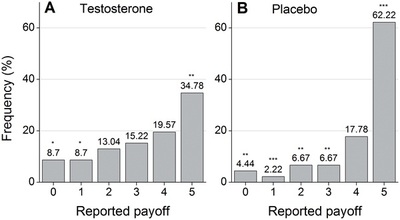Want an honest man? Give him a testosterone boost!
Friday, 02 November, 2012
The sometimes outrageous behaviour of men is often blamed on the sex hormone testosterone, which is known to have an influence on brain development and social behaviour. Several studies have investigated an association between testosterone and aggressive, risky actions. But more recently, studies have suggested that testosterone may also increase prosocial and unselfish behaviour in certain situations.
Researchers at the University of Bonn decided to investigate a link between testosterone and self-serving lying. Surprisingly, the study revealed that a subject’s level of testosterone seems to be linked to his level of honesty. The results have been published in the international online journal PLoS ONE.
The researchers tested the correlation in a study involving 91 healthy young men, who were split into groups and administered with either a 50 mg dose of testosterone or a placebo. The next day they were instructed to roll a die and record the number that came up (one to five, or zero if they rolled a six). The higher the number, the more money they would receive. Furthermore, as a result of the participants’ separate booths, they could not be caught lying by each other or the researchers.
However, the researchers could determine lying at a group level by comparing the reported outcomes with the expected distribution, which statistically should be uniform. The results indicate the likelihood that both groups lied, with skewering towards the end of the scale, but this skewering was much more prevalent in the placebo group.

The average payoff reported was 4.18 for the placebo group and 3.33 for the testosterone group. The researchers also discovered that subjects with higher testosterone levels were associated with lower reported payoffs. Thus, the men who had received the testosterone treatment were less prone to lying, and honesty was even more likely if they had a higher level of testosterone.
At the end of the task the respondents were asked to fill in questionnaires in which, among other things, they were asked whether they thought they had received testosterone or a placebo.
“There was no correlation between actual and perceived testosterone administration,” the researchers state.
So the big question is: why does testosterone appear to increase honesty? There are several theories surrounding this, one of which is the idea that testosterone affects beliefs about the behaviour or beliefs of others. The researchers state that their study has ruled this out.
It has also been suggested that testosterone is associated with a concern for self-image or pride, leading to either aggressive or prosocial behaviour depending on the context. In this experiment, subjects would want to avoid behaviour which makes them feel dishonourable - ie, lying. Professor Dr Armin Falk, an economist from the Center for Economics and Neuroscience (CENs) at the University of Bonn, noted, “Against this background, a few euros are obviously not a sufficient incentive to jeopardise one’s feeling of self-worth.”
Of course, the researchers cannot rule out the idea that perhaps testosterone simply has a direct chemical effect which makes people more prosocial and honest.
Professor Falk says the study has provided a “big step forward” into the biological causes of lying; something about which little is known. However, further research is required into the matter. I know I’ll be conducting some tests on my boyfriend tonight, and I encourage any female readers to do the same.
Solar-powered reactor uses CO2 to make sustainable fuel
Researchers have developed a reactor that pulls carbon dioxide directly from the air and converts...
Scientists simulate the effects of an asteroid collision
How would our planet physically react to a future asteroid strike? Researchers simulated an...
2024 was warmest year on record, 1.55°C above pre-industrial level
The World Meteorological Organization says that 2024 was the warmest year on record, according to...




